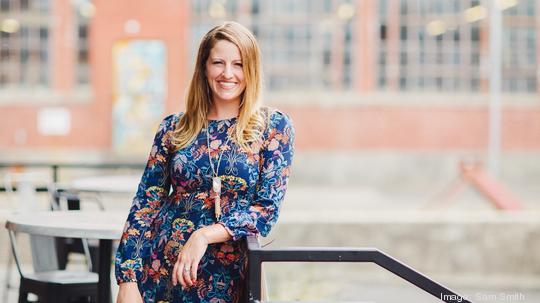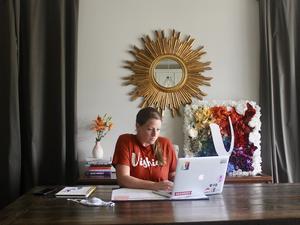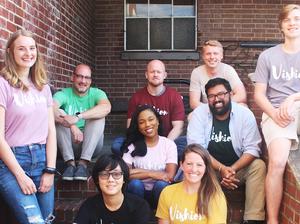
Vishion founder Sam Smith learned the hard way that dreams and plans, no matter how well prepared you are, can change in an instant.
2020 was poised to be a big year for the design-focused startup. It won the SoGal Global Pitch Competition in San Francisco, was named the best early-stage startup in Charlotte Inno's inaugural Inno on Fire awards and was in the process of raising $750,000.
But Covid had other plans. In March, those potential investors began to pull out, and Smith and her team moved on to plan B. During the summer and fall months, Vishion had secured conversations with two major U.S. media companies and made it to the due diligence phase with one of those, the name of which Smith declined to reveal.
"This was it," she thought.
But then, in late October, that company backed out, too.
"It was one of those things that was extremely unexpected," Smith said. "We were three weeks into due diligence, clear on what their step process was, and one day they emailed me and said someone on the team felt we were too early. It was something they had never stated to us previously, but they'd come to a consensus."
Smith was devastated. And even worse, she knew her experience was not unique.
"My response was, 'Everyone is too early at some point. If you believe in the team and the idea, there's nothing that putting money into something won't fix,'" she said. "It's one of those things I wasn't alone in, as far as founders getting, what I believe was, led on."
Vishion was created as a platform that works with brands and partners to help interior designers and design lovers properly identify the colors and decor they're looking for in their projects.
The disintegration of this potential partnership and investment was the catalyst for Smith's decision to completely pivot Vishion to a business-to-business model. It wasn't a decision she wanted to make, but it was one she had to make.
It was a member of her team who asked if she wanted to try one more thing — use the technology the startup already had and its existing runway to provide a color-search plugin for home and fashion brands.
"We don’t have a lot of runway, so it has to go back into a side-hustle formation. As far as what’s next, we’re doing a bunch of research into what it looks like to be in the B2B space," she said. "We’re very much in the still-planning phase. A lot of what’s happened in the last few weeks has been figuring out how we communicate, what the path forward looks like and how we can restructure to make it work going forward."
Last week, Smith posted her story on Medium.com, an open platform where people can share writing on any topic.
In the post, she wrote, "I had the idea for Vishion, the only color search engine for home, the summer of 2017. We launched our mobile app July 2019. We let our users know that we were shutting it down and pivoting to a B2B model [Dec. 8]. No, Vishion is not dead. But this shift from the original mission, and putting my startup back as a side hustle, does feel like a huge failure."
Admitting failure — putting it out there — seemed easy enough, but actually doing it required Smith to check her ego at the door. It was something she admitted was difficult.
"Everyone talks about celebrating failure, but in practice it doesn't really happen. No one wants to be that person. No one wants to sincerely admit it because it's easier to let it float in the background as you go to your next thing," she said. "Your identity becomes so wrapped up in this idea that ... disassociating the two seems impossible. When people think of me, they think of Vishion."
After learning the deal had fallen through, Smith made a handful of important calls — to her husband, her team and her investors — but needed some time to reflect before making any decisions about the future of Vishion or discussing the news publicly. She spent the next month reflecting and was eventually ready to share her experience with the startup community that embraced her when she was just getting started.
"I made the [Medium] post because I didn't want to disappear. Unless I explained what happened to me, I wasn't sure people would know how to react to me in the future," she said. "It was the next step in maintaining a presence and letting people know I want to be here."





